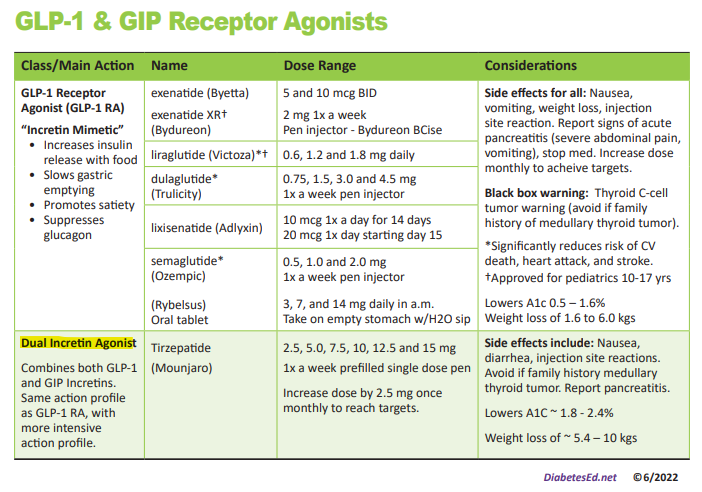Question of the Week | Best advice on adding new med, Mounjaro

The FDA recently approved the new ‘twincretin” dual incretin hormone therapy called Tirzepatide (Mounjaro). The provider wants to start a person with type 2 diabetes on this new medication and asks for your consultation. The person’s current medications for type 2 diabetes include metformin, empagliflozin (Jardiance), semaglutide (Ozempic), and Pravachol. What is the best response to the provider?
- Inform provider that Tirzepatide (Mounjaro) is contraindicated in people taking SGLT-2 Inhibitors.
- Recommend stopping the semaglutide (Ozempic) before starting the Tirzepatide (Mounjaro).
- Reinforce the importance of prescribing a CGM before starting Tirzepatide (Mounjaro).
- Request provider also prescribes Glucagon rescue med in case of severe hypoglycemia.
Click Here to Test your Knowledge
Want to learn more about this question? Read our blog
New Dual Incretin Injectable – “TwinCretin”
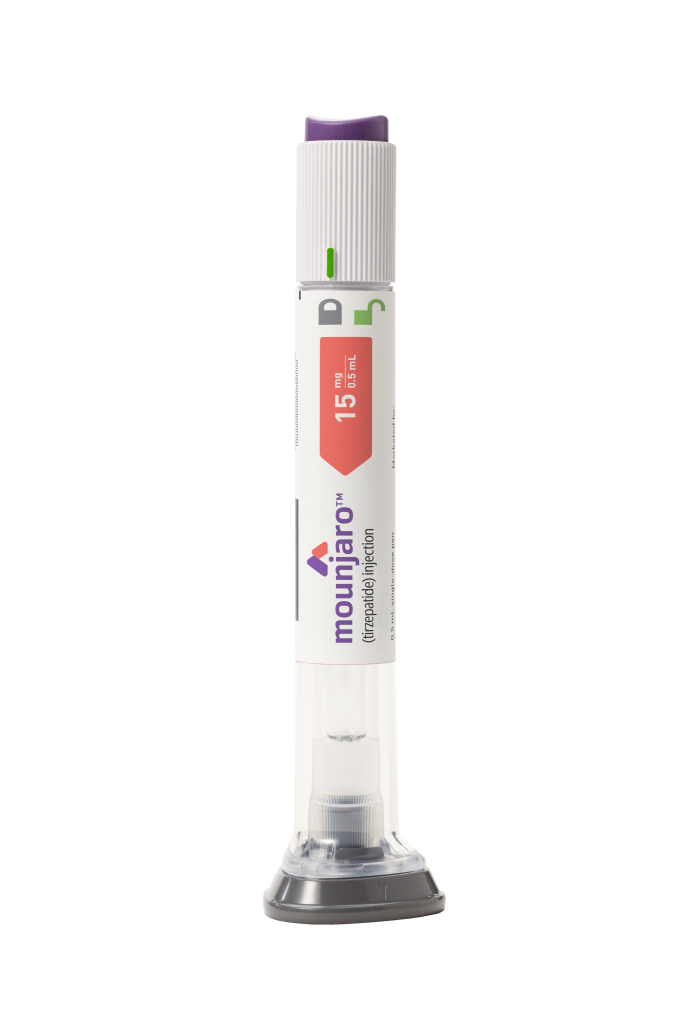
The FDA just approved a novel, dual incretin hormone therapy called Tirzepatide (Mounjaro).
This new twin incretin injectable includes not only a GLP-1 Receptor Agonist, but also a Glucose-dependent insulinotropic polypeptide (GIP), which magnifies the therapeutic effectiveness. The SURPASS studies indicate that study participants experienced an A1C drop of up to 2.5% and weight loss of up to 10kg or more.
Enroll in our Test Taking Practice Exam Toolkit | FREE Webinar
Are You Ready for Exam Success?
Join us live Thursday, June 30th at 11:30 am PST
Learn Test-Taking Secrets with Coach Bev – Option to add on 200+ Computerized Practice Test Questions for $49
During this webinar, Coach Beverly will help you transform your nervousness into focused energy that will help you succeed. She will provide test-taking tips based on her experience taking the certification exam six times.
To provide plenty of practice, Coach Beverly will sample 20 test questions that have been plucked from our Test Taking Toolkit during this live webinar.
She will explain how to dissect the question, eliminate wrong answers and avoid getting lured in by juicy answers.
Two Ways to Join
Includes a review of 20 sample test questions with test taking strategies.
This includes access to the recorded version of this webinar on your Online University Student Portal.
Plus, the Test Taking Toolkit provides you with over 200+ sample online practice questions, simulating the exam experience.
A perfect way to assess your knowledge and create a focused study plan, while increasing your test-taking confidence.
The use of DES products does not guarantee the successful passage of the CDCES exam. CBDCE does not endorse any preparatory or review materials for the CDCES exam, except for those published by CBDCE.
FREE Self-Care Goal Sheet – Now In Spanish
We are excited to share this FREE Diabetes Self-Care Goal Sheet that you can customize for your practice.
Setting realistic person-centered goals is a critical part of providing diabetes education care and support. We have created a goal sheet that you can use in your practice to capture the next steps toward improving self-care.
You can customize this sheet with your logo and contact information or just download and print the PDF to get started. No permission is needed. We are delighted to share these sheets with you.
- Diabetes Self-Care Goal Sheet in English in Word and Diabetes Self-Care Goal Sheet in Spanish in Word so you can make modifications for your practice.
- Or you can download the PDF version of the Diabetes Self-Care Goal Sheet in English and PDF version of the Diabetes Self-Care Goal Sheet in Spanish, print and go.
Start small and Build on Success
Taking on a new behavior is not easy.
By careful coaching, we can help participants create goals that are REALLY achievable and important to the individual.
For example, someone says they want to “eat more healthfully”, then we can ask, “What would that look like for you?”. They might reply, “I want to eat for more fruits and vegetables instead of junk food”. To get more specific, we can discuss how many servings of fruit and vegetables a day do they think would be realistic? We can encourage individuals to start with one to two servings a day and gradually increase portions as the person gains more confidence in their ability.
To help build success, we may want to emphasize that is doesn’t matter whether people consume fresh, frozen or canned fruits and vegetables. They all offer similar nutrient values. The main consideration is highlighting affordable and appealing fruits and veggies based on the individuals’ taste and preferences.
This simple goal sheet can help capture the negotiated goals and follow-up care activities. This checklist of activities can also be reminders for us to discuss eye and foot care, plus oral hygiene and vaccinations too.
Self-Care Cheat Sheets in English
Self-Care Cheat Sheets in Spanish
Test Taking Practice Exam Toolkit | FREE Webinar
Are You Ready for Exam Success?
Join us live Thursday, June 30th at 11:30 am PST
Learn Test-Taking Secrets with Coach Bev – Option to add on 200+ Computerized Practice Test Questions for $49
During this webinar, Coach Beverly will help you transform your nervousness into focused energy that will help you succeed. She will provide test-taking tips based on her experience taking the certification exam six times.
To provide plenty of practice, Coach Beverly will sample 20 test questions that have been plucked from our Test Taking Toolkit during this live webinar.
She will explain how to dissect the question, eliminate wrong answers and avoid getting lured in by juicy answers.
Two Ways to Join
Includes a review of 20 sample test questions with test taking strategies.
This includes access to the recorded version of this webinar on your Online University Student Portal.
Plus, the Test Taking Toolkit provides you with over 200+ sample online practice questions, simulating the exam experience.
A perfect way to assess your knowledge and create a focused study plan, while increasing your test-taking confidence.
The use of DES products does not guarantee the successful passage of the CDCES exam. CBDCE does not endorse any preparatory or review materials for the CDCES exam, except for those published by CBDCE.
Rationale of the Week | New diabetes at 13, best next step?

For last week’s practice question, we quizzed test takers on MR who was recently diagnosed with diabetes at age 13. 70% of respondents chose the best answer. We want to share this important information, so you can pass it on to people living with diabetes and your colleagues, plus prepare for exam success!
Before we start though, if you don’t want any spoilers and haven’t tried the question yet, you can answer it below: Answer Question
Question: MR is 13 years old, and went to urgent care because they weren’t feeling well and told the Provider “I feel so tired all the time and I have to go the bathroom a lot”. The provider draws labs and gets a urine sample. The A1C is 8.7% with some ketones in the urine. The antibody results aren’t back yet. Based on the ADA Standards and this information, what is the best action?
Answer Choices:
- Start MR on basal insulin
- Order a nutrition consult ASAP and provide MR with a meter
- Initiate GLP-1 therapy to help lower glucose and A1C
- Start metformin therapy, then add exenatide XR if needed
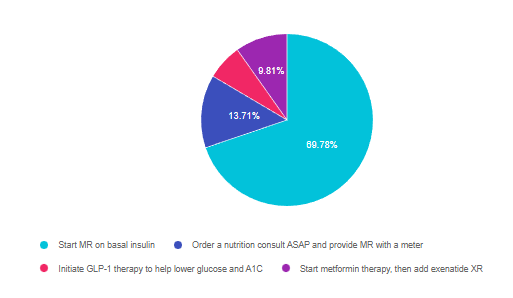
As shown above, the most common choice was option 1, the second most common answer was option 2, then option 4, and finally 3.
Getting to the Best Answer
Answer 1 is correct. 69.78% chose this answer, “Start MR on basal insulin.” YES, GREAT JOB. This is the best answer according to ADA Standard 14 on Diabetes and Youth. If a person under the age of 18 has new-onset diabetes and an A1C of 8.5% or greater, basal insulin is needed to get blood glucose to target and stop ketosis. The next step is to determine if they have immune-mediated diabetes by evaluating their autoantibodies. If they don’t have autoantibodies (GAD, ICA, IAA), then the guidelines suggest starting metformin and gradually decreasing the insulin to see if they can be managed on metformin alone or with the addition of a GLP-1 RA. If the antibodies come back positive, MR would need to be managed on basal-bolus insulin therapy.
Answer 2 is incorrect. 13.71% of you chose this answer, “Order a nutrition consult ASAP and provide MR with a meter.” This is a juicy answer since a nutrition consult and meter are critical to managing a new diabetes diagnosis. However, we would provide the nutrition consult after we figure out what type of diabetes and after lowering blood glucose levels with insulin to prevent a hyperglycemic crisis. Regardless of the type of diabetes, ordering a meter right away and providing basic nutrition guidelines are both critical steps to keep MR safe and to evaluate treatment response.
Answer 3 is incorrect. 6.70% of respondents chose this answer, “Initiate GLP-1 therapy to help lower glucose and A1C.” Since the A1C is above 8.5%, the ADA Standards state to start basal insulin to lower glucose and prevent hyperglycemic crises. If the autoantibodies come back negative, we would start metformin therapy and consider a GLP-1 RA as a future add-on therapy.
Finally, Answer 4 is incorrect. 9.81% chose this answer, “Start metformin therapy, then add exenatide XR if needed.” Since the A1C is above 8.5%, the ADA Standards state to start basal insulin to lower glucose and prevent a hyperglycemic crisis. If the autoantibodies come back negative, we would start metformin therapy and consider a GLP-1 RA as a future add-on therapy.
Want to learn more about this question? Join us for our upcoming webinar
Test Taking Practice Exam Toolkit | FREE Webinar
Are You Ready for Exam Success?
Join us live Thursday, June 30th at 11:30 am PST
Learn Test-Taking Secrets with Coach Bev – Option to add on 200+ Computerized Practice Test Questions for $49
During this webinar, Coach Beverly will help you transform your nervousness into focused energy that will help you succeed. She will provide test-taking tips based on her experience taking the certification exam six times.
To provide plenty of practice, Coach Beverly will sample 20 test questions that have been plucked from our Test Taking Toolkit during this live webinar.
She will explain how to dissect the question, eliminate wrong answers and avoid getting lured in by juicy answers.
Two Ways to Join
Includes a review of 20 sample test questions with test-taking strategies.
This includes access to the recorded version of this webinar on your Online University Student Portal.
Plus, the Test Taking Toolkit provides you with over 200+ sample online practice questions, simulating the exam experience.
A perfect way to assess your knowledge and create a focused study plan, while increasing your test-taking confidence.
From Tots to Teens | Level 2 | $29 for 1.5 CEs
Recorded & Ready to Watch!

This course includes updated goals and guidelines for children living with type 1 or type 2 diabetes. This course discusses the special issues diabetes educators need to be aware of when working with children with diabetes and their families. We discuss the clinical presentation of diabetes, goals of care, and normal growth and development through the early years through adolescence. Strategies to prevent acute and long term complications are included with an emphasis on positive coping for family and child with diabetes.
Objectives:
- Discuss the goals of care for Type 1 and Type 2 Kids with Diabetes
- State Strategies to prevent acute and chronic complications
- Discuss the importance of positive psychosocial adjustment and resources
The use of DES products does not guarantee the successful passage of the CDCES exam. CBDCE does not endorse any preparatory or review materials for the CDCES exam, except for those published by CBDCE.
Does Intermittent Fasting Really Lead to Weight Loss?
In health care settings across the country, people with diabetes and providers have been asking if intermittent fasting is effective at helping with weight loss. Finally, a randomized outpatient study provides some answers so we can accurately respond to this frequently asked question.
According to a recent study published in The New England Journal of Medicine, “a regimen of time-restricted eating was not more beneficial with regard to reduction in body weight, body fat, or metabolic risk factors than daily calorie restriction.”
In this study, 139 participants were randomized into two groups. Both groups were placed on a limited calorie diet. Men in the study were limited to a 1500 to 1800 kcal per day diet while women were limited to a 1200 to 1500 kcal per day diet.
The main difference, was the eating time frame.
The intermittent fasting group ate their calorie-restricted diet between the limited hours of 8:00 am to 4:00 pm. Which is a fasting period of 16 hours and an eating window of 8 hours.
The control group also followed the calorie restrictions but could eat their assigned calories at whatever time.
Results After One Year
After a 12-month period of following these diets, each group was evaluated for changes in body weight, body fat, waist circumference, body-mass index (BMI), and metabolic risk factors. 85% of participants completed the trial.
The participants in the time-restricted group had a mean weight loss from baseline of -8.0 kg while the calorie restriction only group had a 6.3 kg mean weight loss from baseline. While the time-restricted group had a higher weight loss, it wasn’t enough to reach statistical significance.
Additionally, there were no statistically significant changes in waist circumference, body fat, body lean mass, BMI, blood pressure, and other metabolic risk factors between the two groups.
The conclusion is that time-restricted eating was not significantly beneficial in weight loss in comparison to following a calorie-restricted diet.
To read more, click here.
Question of the Week | Best blood sugar fix?

LS wears an insulin pump and uses lispro insulin. LS has an average basal rate of 0.6 units and hour, a 1:15 carb ratio and a 1:50 correction ratio. Based on the ambulatory glucose profile, LS is experiencing elevated glucose levels from 4am to 7am. To get glucose to target, what is the best next step?
- Add basal insulin glargine to prevent Somogyi effect
- Make sure LS isn’t consuming carbohydrates after 10pm
- Ask LS to double check their CGM insertion site
- Increase the basal rate to prevent glucose elevations
Click Here to Test your Knowledge
Want to learn more about this question? Join us for our upcoming webinar
Test Taking Practice Exam Toolkit | FREE Webinar
Are You Ready for Exam Success?
Join us live Thursday, June 30th at 11:30 am PST
Learn Test-Taking Secrets with Coach Bev – Option to add on 200+ Computerized Practice Test Questions for $49
During this webinar, Coach Beverly will help you transform your nervousness into focused energy that will help you succeed. She will provide test-taking tips based on her experience taking the certification exam six times.
To provide plenty of practice, Coach Beverly will sample 20 test questions that have been plucked from our Test Taking Toolkit during this live webinar.
She will explain how to dissect the question, eliminate wrong answers and avoid getting lured in by juicy answers.
Two Ways to Join
Includes a review of 20 sample test questions with test taking strategies.
This includes access to the recorded version of this webinar on your Online University Student Portal.
Plus, the Test Taking Toolkit provides you with over 200+ sample online practice questions, simulating the exam experience.
A perfect way to assess your knowledge and create a focused study plan, while increasing your test-taking confidence.
Want to learn more about Diabetes Care? View our
Virtual DiabetesEd Specialist Conference
30+ CEs
Airs October 12-14th, 2022
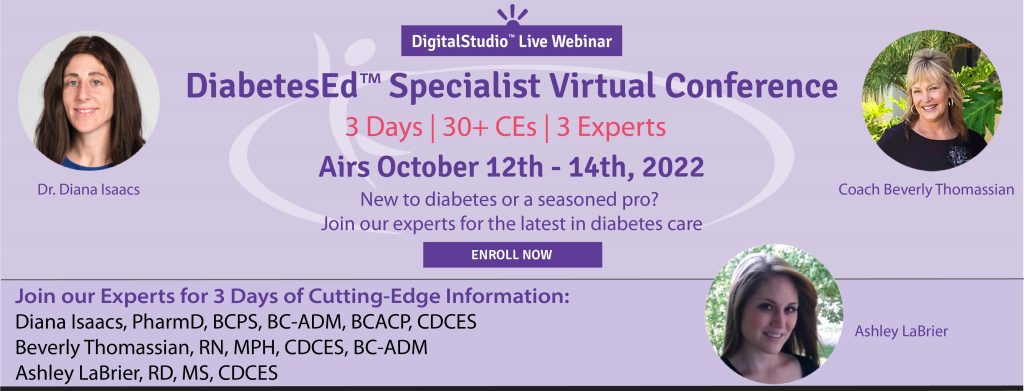
Whether you are new to diabetes or a seasoned expert, you’ll benefit from this virtual conference with the latest research plus critical content that you can immediately apply to your clinical practice.
Download Course Flyer | Download Schedule
If you are seeking a state-of-the-art review of current diabetes care, this course is for you. Our team has been fine-tuning this course for over fifteen years, and we know what you need. This program can also be a great addition to your CDCES or BC-ADM exam study plan.
Join us LIVE for this Virtual Course and enjoy a sense of community!
Team of expert faculty includes:
- Diana Isaacs, PharmD, BCPS, BC-ADM, BCACP, CDCES – Educator of the Year, 2020
- Coach Beverly Thomassian, RN, MPH, CDCES, BC-ADM
- Ashley LaBrier, MS, RD, CDCES, Diabetes Program Coordinator
Two Registration Options
Virtual DiabetesEd Specialist Conference Deluxe | 30+ CEs
Deluxe Option for $499: Virtual Program includes:
- Q & A Session with the instructor after each webinar.
- LIVE Presentations by our team of experts.
- State of the art review of current diabetes care and technology.
- Resources for each session.
- Access to free podcasts and video recordings within a week of each live session for one year.
Deluxe Version includes Syllabus, Standards and Swag*:
- Diabetes Educator Course 2022 Syllabus Hard Copy – over 100 pages -This spiral-bound workbook contains the printed version of all of the instructor’s slides.
- ADA 2022 Standards of Care Book -The ADA Standards of Medical Care in Diabetes is a key resource for healthcare professionals involved in diabetes care, education, and support.
- DiabetesEd Services highlighters, Medication PocketCard, Tote Bag and Pen
Virtual DiabetesEd Specialist Conference Basic | 30+ CEs
Basic Option for $399: Virtual Program includes:
- Q & A Session with the instructor after each webinar.
- LIVE Presentations by our team of experts.
- State of the art review of current diabetes care and technology.
- Resources for each session.
- Access to free podcasts and video recordings within a week of each live session for one year.
Don’t worry if you can’t make it live. Your registration guarantees access to the recorded version in the Online University.
All hours earned count toward your CDCES Accreditation Information
Sign up for Diabetes Blog Bytes – we post one daily Blog Byte from Monday to Friday. And of course, Tuesday is our Question of the Week. It’s Informative and FREE! Sign up below!
The use of DES products does not guarantee the successful passage of the CDCES exam. CBDCE does not endorse any preparatory or review materials for the CDCES exam, except for those published by CBDCE.
Rationale of the Week | What is true about fatty liver disease?

For last week’s practice question, we quizzed test takers on fatty liver disease. 57% of respondents chose the best answer. We want to share this important information, so you can pass it on to people living with diabetes and your colleagues, plus prepare for exam success!
Before we start though, if you don’t want any spoilers and haven’t tried the question yet, you can answer it below: Answer Question
Question: 45 to 75% of individuals with type 2 diabetes have non-alcoholic fatty liver disease (NAFLD). NAFLD has associated with an increased risk of steatohepatitis, cirrhosis, and liver cancer. Which of the following statements is true based on ADA Standards of Care?
Answer Choices:
- Elevated ALT and AST indicate a diagnosis of NAFLD.
- Approved treatment for NAFLD includes low-dose aspirin and pioglitazone.
- Fatty liver disease indicates that 5-10% of the liver weight is from fat.
- Surgical intervention is indicated to resect the liver in the presence of NAFLD.
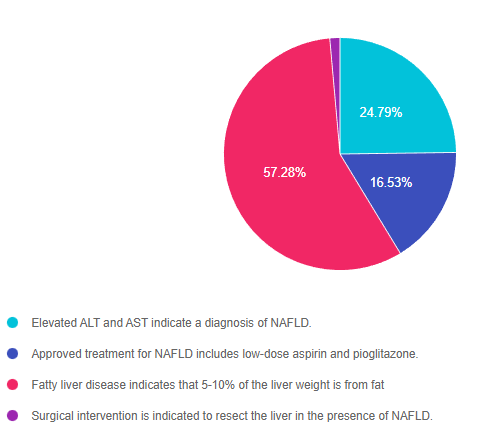
As shown above, the most common choice was option 3, the second most common answer was option 1, then option 2, and finally 4.
Getting to the Best Answer
Answer 1 is incorrect. 24.79% chose this answer, “Elevated ALT and AST indicate a diagnosis of NAFLD.” These two liver enzyme tests certainly indicate liver inflammation and are a signal that further investigation is warranted. However, to confirm and diagnose NAFLD, a comprehensive review of patient history, lab results, liver imaging studies and possibly a biopsy are required.
Answer 2 is incorrect. 16.53% of you chose this answer, “Approved treatment for NAFLD includes low-dose aspirin and pioglitazone.” The cornerstones of treatment for NAFLD are nutrition therapy interventions with a focus on decreasing processed foods, sugary beverages and foods high in saturated fat. Plus, increasing intake of whole foods and committing to a structured physical activity plan to decrease visceral and hepatic adiposity is imperative. There is no officially approved medication to treat NAFLD, but pioglitazone and GLP-1 RA’s appear to decrease fatty liver based on current studies.
Answer 3 is correct. 57.28% of respondents chose this answer, “Fatty liver disease indicates that 5-10% of the liver weight is from fat.” GREAT JOB, this is the best answer. The good news is that weight loss and increased activity are very effective in treating fatty liver disease. A weight loss of 7-10% linked with a 50% drop in liver fat. Every pound lost makes a big difference. The cornerstones of treatment for NAFLD are nutrition therapy interventions with a focus on decreasing processed foods, sugary beverages and foods high in saturated fat. Plus, increasing intake of whole foods and committing to a structured physical activity plan to decrease visceral and hepatic adiposity is imperative.
Finally, Answer 4 is incorrect. 1.41% chose this answer, “Surgical intervention is indicated to resect the liver in the presence of NAFLD.” People with NAFLD and other risk factors, have an increased risk of disease progression to cirrhosis and liver cancer, which might require surgical intervention. However, no surgical intervention is warranted for NAFLD. The cornerstones of treatment for NAFLD are nutrition therapy interventions with a focus on decreasing processed foods, sugary beverages and foods high in saturated fat. Plus, increasing intake of whole foods and committing to a structured physical activity plan to decrease visceral and hepatic adiposity is imperative.
Want to learn more about this question? Join us for our upcoming webinar
Test Taking Practice Exam Toolkit | FREE Webinar
Are You Ready for Exam Success?
Join us live Thursday, June 30th at 11:30 am PST
Learn Test-Taking Secrets with Coach Bev – Option to add on 200+ Computerized Practice Test Questions for $49
During this webinar, Coach Beverly will help you transform your nervousness into focused energy that will help you succeed. She will provide test-taking tips based on her experience taking the certification exam six times.
To provide plenty of practice, Coach Beverly will sample 20 test questions that have been plucked from our Test Taking Toolkit during this live webinar.
She will explain how to dissect the question, eliminate wrong answers and avoid getting lured in by juicy answers.
Two Ways to Join
Includes a review of 20 sample test questions with test taking strategies.
This includes access to the recorded version of this webinar on your Online University Student Portal.
Plus, the Test Taking Toolkit provides you with over 200+ sample online practice questions, simulating the exam experience.
A perfect way to assess your knowledge and create a focused study plan, while increasing your test-taking confidence.
Want to learn more about Diabetes Care? View our
Virtual DiabetesEd Specialist Conference
30+ CEs
Recorded & Ready to Watch!
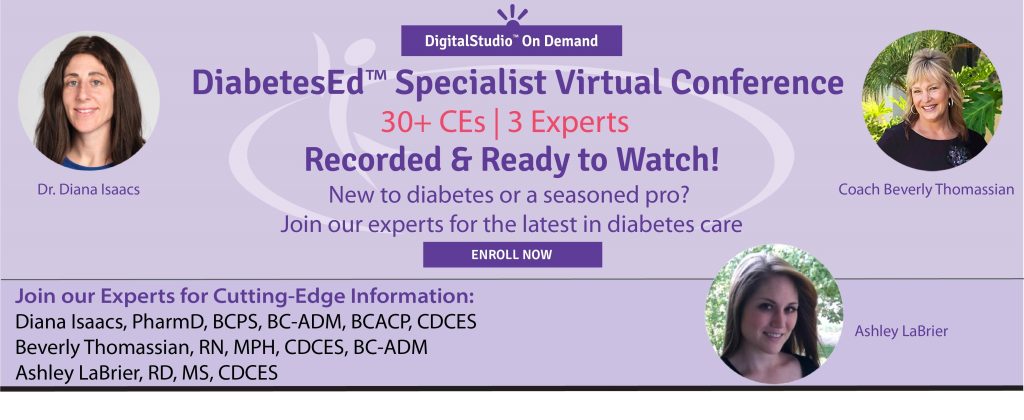
Whether you are new to diabetes or a seasoned expert, you’ll benefit from this virtual conference with the latest research plus critical content that you can immediately apply to your clinical practice.
Download Course Flyer
If you are seeking a state-of-the-art review of current diabetes care, this course is for you. Our team has been fine-tuning this course for over fifteen years, and we know what you need. This program can also be a great addition to your CDCES or BC-ADM exam study plan.
Join us LIVE for this Virtual Course and enjoy a sense of community!
Team of expert faculty includes:
- Diana Isaacs, PharmD, BCPS, BC-ADM, BCACP, CDCES – Educator of the Year, 2020
- Coach Beverly Thomassian, RN, MPH, CDCES, BC-ADM
- Ashley LaBrier, MS, RD, CDCES, Diabetes Program Coordinator
Virtual DiabetesEd Specialist Conference Deluxe | 30+ CEs
Deluxe Option for $449: Virtual Program includes:
- Q & A Session with the instructor after each webinar.
- LIVE Presentations by our team of experts.
- State of the art review of current diabetes care and technology.
- Resources for each session.
- Access to free podcasts and video recordings within a week of each live session for one year.
Deluxe Version includes Syllabus, Standards and Swag*:
- Diabetes Educator Course 2022 Syllabus Hard Copy – over 100 pages -This spiral-bound workbook contains the printed version of all of the instructor’s slides.
- ADA 2022 Standards of Care Book -The ADA Standards of Medical Care in Diabetes is a key resource for healthcare professionals involved in diabetes care, education, and support.
- DiabetesEd Services highlighters, Medication PocketCard, Tote Bag and Pen
Don’t worry if you can’t make it live. Your registration guarantees access to the recorded version in the Online University.
All hours earned count toward your CDCES Accreditation Information
Sign up for Diabetes Blog Bytes – we post one daily Blog Byte from Monday to Friday. And of course, Tuesday is our Question of the Week. It’s Informative and FREE! Sign up below!
The use of DES products does not guarantee the successful passage of the CDCES exam. CBDCE does not endorse any preparatory or review materials for the CDCES exam, except for those published by CBDCE.
New Injectable – “TwinCretin” on Printed PocketCards
We have just added this novel, first in class, dual incretin hormone therapy, Tirzepatide (Mounjaro), to our printed version of our Diabetes Medication PocketCard.
This new twin therapy includes not only a GLP-1 Receptor Agonist, but also a Glucose-dependent insulinotropic polypeptide (GIP), which magnifies the therapeutic effectiveness. The SURPASS studies indicate that study participants experienced an A1C drop of up to 2.5% and weight loss of up to 10kg or more.
How does it work?

Incretins (GLP-1 and GIPs) play a major role in glucose regulation post prandially. Incretins are gut hormones that stimulate insulin release from the pancreas when glucose rises in response to food ingestion. They keep blood sugars in check as well as activating the satiety center, to increase the sense of fullness. Incretins slow gastric emptying and also curb post-meal glucagon release, decreasing post prandial glucose spikes. Unfortunately, people with type 2 diabetes, make less than half of the usual amount of the GLP-1 and GIP hormones, which contributes to chronically elevated glucose levels.
To date, therapies that have only included the Glucagon-Like Peptide-1 (GLP-1) have demonstrated major success in managing Type 2 DM.
By creating a formulation with BOTH the GIP and GLP incretin hormones, the A1C lowering and weight loss effectiveness has been significantly amplified.
First in Class – Dual Incretin Injectable Therapy
Tirzepatide is a novel synthetic peptide, engineered to provide a once-weekly injectable medication that acts on glucose-dependent insulinotropic polypeptide (GIP) and glucagon-like peptide-1 (GLP-1) receptors.
Tirzepatide has been granted FDA approval for treatment of type 2 diabetes based primarily on a series of trials known as SURPASS. The SURPASS 1 trial compared increasing doses to evaluate dose response. The SURPASS 2-5 Trials compared tirzepatide to the GLP-1 semaglutide and to the basal insulins degludec and glargine. In all of the trials, the findings were impressive.
Summary of SURPASS Trials and Results based on Tirzepatide Package Insert.
- SURPASS -1 Dose efficacy study ranging rom 5 to 15 mg, evaluating A1C and weight loss. Up to 85% of participants on tirzepatide achieved an A1C of less than 7%. A1C drop of 1.7% with 15mg dose. Weight loss of up to 7.8kgs.
- SURPASS-2 Compared tirzepatide with patients on metformin to semaglutide. Up to 86% of participants on tirzepatide achieved an A1C of less than 7%. A1C drop of 2.3% with 15mg dose. Weight loss of up to 11.2 kgs.
- SURPASS-3 Compared tirzepatide with patients on metformin, with our without an SGLT-2 Inhibitor to Insulin degludec. Up to 83% of participants on tirzepatide achieved an A1C of less than 7%. A1C drop of 2.1% with 15mg dose and weight loss of up to 11.3kgs.
- SURPASS-4 Compared tirzepatide with people on metformin, and/or sulfonylureas and/or SGLT-2s with Insulin Glargine in people with increased cardiovascular risk. Up to 85% of participants on tirzepatide achieved an A1C of less than 7%. A1C drop of 2.4% with 15mg dose and weight loss of up to 10.6 kgs.
- SURPASS-5 Compared tirzepatide vs placebo in people taking Insulin glargine with or without metformin. Up to 90% of participants on tirzepatide achieved an A1C of less than 7%. A1C drop of 2.4% with 10mg dose and weight loss of up to 10.5kgs.
Tirzepatide (Mounjaro) Indications and Dosing
This once a week injectable is for adults with type 2 diabetes as an adjunct to diet and exercise to improve glycemic control and support weight loss. Tirzepatide is delivered with a single dose prefilled pen.
Starting Dose: 2.5 mg SC every week for 4 weeks initially; THEN increase to 5 mg SC every week. If additional glycemic improvement is needed, increase by 2.5-mg increments after at least 4 weeks at current dose.
Note: The initial 2.5-mg dose is intended for treatment initiation and is not effective for glycemic control
Maximum dose: 15 mg SC qWeek
Common Adverse Side effects: Nausea, diarrhea, abdominal discomfort and injection site hypersensitivity reactions. There is also a black box warning to avoid if family history of medullary thyroid tumor and to report any signs of pancreatitis immediately.
Cost: Tirzepatide is comparably priced to other GLP-1 RAs on the market at $974.33 for four weekly doses, regardless of dose size. Hopefully, insurance companies will recognize the long term benefits of these newer classes of agents, and increase coverage of these beneficial treatment options.
In conclusion: This new medication class substantially lowers blood sugars and body weight, with a once a week injection. Coupled with healthy eating and keeping active, people with diabetes have the opportunity to improve their health and quality of life with this novel medication class.
Author’s note: Beverly Thomassian has no conflict of interest to report and distilled the content of this article from the SURPASS study results and the tirzepatide package insert.
*PocketCardsTM are for individual use only.
Question of the Week | New diabetes at 13, best next step?

MR is 13 years old, and went to urgent care because they weren’t feeling well and told the Provider “I feel so tired all the time and I have to go the bathroom a lot”. The provider draws labs and gets a urine sample. The A1C is 8.7% with some ketones in the urine. The antibody results aren’t back yet. Based on the ADA Standards and this information, what is the best action?
- Start MR on basal insulin
- Order a nutrition consult ASAP and provide MR with a meter
- Initiate GLP-1 therapy to help lower glucose and A1C
- Start metformin therapy, then add exenatide XR if needed
Click Here to Test your Knowledge
Want to learn more about this question? Join us for our upcoming webinar
Test Taking Practice Exam Toolkit | FREE Webinar
Are You Ready for Exam Success?
Join us live Thursday, June 30th at 11:30 am PST
Learn Test-Taking Secrets with Coach Bev – Option to add on 200+ Computerized Practice Test Questions for $49
During this webinar, Coach Beverly will help you transform your nervousness into focused energy that will help you succeed. She will provide test-taking tips based on her experience taking the certification exam six times.
To provide plenty of practice, Coach Beverly will sample 20 test questions that have been plucked from our Test Taking Toolkit during this live webinar.
She will explain how to dissect the question, eliminate wrong answers and avoid getting lured in by juicy answers.
Two Ways to Join
Includes a review of 20 sample test questions with test taking strategies.
This includes access to the recorded version of this webinar on your Online University Student Portal.
Plus, the Test Taking Toolkit provides you with over 200+ sample online practice questions, simulating the exam experience.
A perfect way to assess your knowledge and create a focused study plan, while increasing your test-taking confidence.
From Tots to Teens | Level 2 | $29 for 1.5 CEs
Recorded & Ready to Watch!

This course includes updated goals and guidelines for children living with type 1 or type 2 diabetes. This course discusses the special issues diabetes educators need to be aware of when working with children with diabetes and their families. We discuss the clinical presentation of diabetes, goals of care, and normal growth and development through the early years through adolescence. Strategies to prevent acute and long term complications are included with an emphasis on positive coping for family and child with diabetes.
Objectives:
- Discuss the goals of care for Type 1 and Type 2 Kids with Diabetes
- State Strategies to prevent acute and chronic complications
- Discuss the importance of positive psychosocial adjustment and resources
The use of DES products does not guarantee the successful passage of the CDCES exam. CBDCE does not endorse any preparatory or review materials for the CDCES exam, except for those published by CBDCE.



